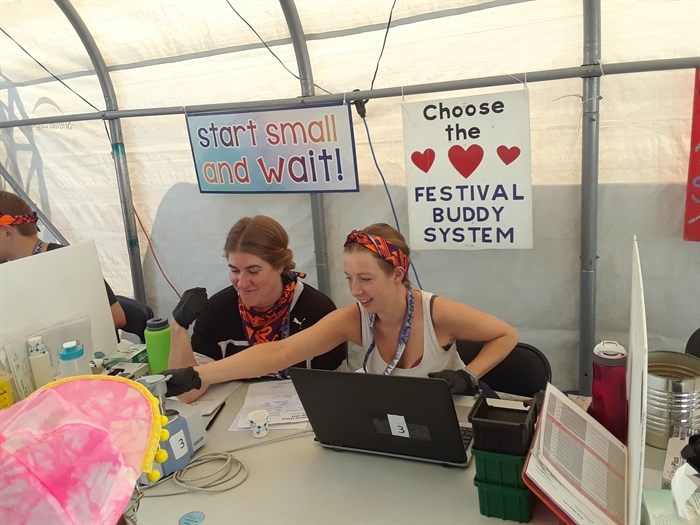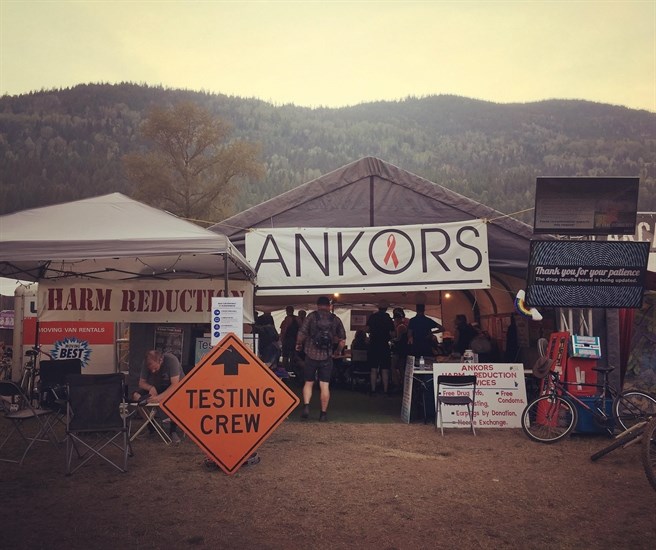
ANKORS members on site at a previous Shambhala Music Festival.
Image Credit: SUBMITTED/Chloe Sage
May 29, 2022 - 8:40 AM
As the summer season brings the return of concerts and events to the region, venues are taking notes from a West Kootenay music festival that has taken a different approach to deter overdoses for nearly 20 years.
Shambhala Music Festival is set to return July 22 to 25 after two years of cancellations due to the pandemic. Festival organizers have worked with AIDS Network Kootenay Outreach and Support Society to provide harm reduction services for drug users since 2004.
Chloe Sage is the drug checking project lead for the outreach society and a harm reduction coordinator with Interior Health. From the rave community herself, she remembers how small and controversial Shambhala’s drug checking service was when it first began.
There wasn't even a sign indicating what the outreach society was, she said. It spread through word of mouth and two people providing the checks feared they could be arrested. At the time it was one of many grassroots drug checking initiatives trying to get off the ground.

The ANKORS site at a previous Shambhala Music Festival.
Image Credit: SUBMITTED/Chloe Sage
“It took a long time to get the courage… the festival was really worried about what this would look like, if we were enabling and encouraging drug use and that’s not what drug checking is about, it’s about responding to risks that are there,” Sage said. Some festivals tried to implement drug checking services but companies threatened to cut their insurance.
READ MORE: Scale up B.C. drug-checking programs to save lives: centre on substance use
“We were the only ones doing this at festivals in Canada for a very long time,” Sage said.
The initiative was successful because of two factors: the event is on private land so they could make their own decisions and one of the festival’s founders helped reach out to the community to establish harm reduction, she said.
Since the opioid crisis began in 2016, more attention has been brought to Shambhala’s approach, which includes more than just drug checking.
A place for those who want to remain sober throughout the festival has been growing every year and there’s a safe space where women and members of the LGBTQ+ can find community. A place called The Sanctuary provides ravers with a place to relax if they have a bad trip and outreach workers walk throughout the festival, promoting safe sexual consent.
The festival’s guide to drug checking is being used worldwide, according to the festival’s most recent video on harm reduction.
“I think it’s turned around,” Sage said, adding the province now recommends festivals have harm reduction services, including drug checking, on site. It’s also much easier for festivals to get an exemption from the federal Controlled Drugs and Substances Act to run a supervised consumption site.
Video Credit: Shambhala Music Festival
Harm Reduction and the Sanctuary
A first-aid station on site is likened to a “field hospital,” Sage said, that has set protocols that are being copied across the country, especially when responding to overdoses of GHB, a party drug.
The outreach society has 70 people on site and tests more than 3,000 substances each year. That number continues to grow. Sage noted they see a 25% increase in their service each year. She estimates there are about 18,000 attendees with thousands of workers providing support services at the festival.
Hospital transfers have gone down each year, she said. Since its inception in 1998, one overdose death was reported in 2012 at the festival.
Historically, they’ve also been seeing less contaminated drugs, although things are up in the air this year with COVID-19. The pandemic has affected all aspects of the illegal drug market, Sage said.

FILE PHOTO - Shambhala Music Festival in Salmo, B.C.
Image Credit: Shambhala Music Festival
The festival's main impact across the country has been to push harm reduction policies forward, she said.
“I don’t think we had the idea and everybody followed us, I think we helped support those groups that are trying really hard (to implement these services,)” she said. “It’s also happening not just at festivals.”
Last weekend, Sage attended a group that plans to provide a mobile drug checking site in Montreal. Drug checking sites have been implemented across the country, with the first being located in the West Kootenays in 2015.
This year, the outreach society is also providing drug checking services at Bass Coast, in Merritt, for the third time.
“There’s a lot of new people using the service, that’s one of the successes that we see. Also, people lining up for two hours shows that it’s a service that people need,” she said. The outreach society team also comes from the community and understands the needs of festival goers.
“Festivals are getting prepared in terms of harm reduction,” she said.
For harm reduction efforts to be effective, there has to be a collaboration between event organizers, public health, service providers and police, said UBC researcher Adam Lund, an emergency physician with an interest in mass gatherings medicine and special events.
At Big White's AltiTunes Music Fest in April, they had drug testing on site, said senior vice president Michael Ballingall, in a previous interview with iNFOnews.
READ MORE: Volunteers tested drugs for first time at Big White music festival
“Harm reduction has a bit of a grassroots culture. There’s a very strong and important peer-to-peer culture associated with it and as a result… that peer to peer confidential and private culture makes it hard to collect data to do research, particularly in the context where there are some legal overtones,” Lund said.
“Without the alignment of all the right authorities, you could theoretically find yourself in possession, however briefly, of an illegal substance… there could be consequences to people providing that service,” he said. “We would hate for anyone to suffer a consequence of a good intention around a health intervention.”
“In the context of the overdose and fentanyl and opioid crisis that we’re seeing, there’s been a bit of shift in the tides. I think some of the stakeholders that have been very reluctant to have those conversations in the past are more open to it because I think... in the community we all recognize the devastating impact this has had so there’s openness to talk about all of the things (including drug checking),” he said.
Lund believes with more conversation, there’s been more interest in conducting trial services “that I think would be beneficial.”
In 2017, a harm reduction service was also set up at Snow Bombing at Sun Peaks Ski Resort.
READ MORE: Sun Peaks being proactive about drug use at Snowbombing music festival
By no means would the message be that the drugs tested are safe, as there is a variety of factors to consider, including how the individual reacts to drugs taken, Lund said.
“The most important intervention around substance checking is it’s an engagement into a conversation,” he said.
To contact a reporter for this story, email Carli Berry or call 250-864-7494 or email the editor. You can also submit photos, videos or news tips to the newsroom and be entered to win a monthly prize draw.
We welcome your comments and opinions on our stories but play nice. We won't censor or delete comments unless they contain off-topic statements or links, unnecessary vulgarity, false facts, spam or obviously fake profiles. If you have any concerns about what you see in comments, email the editor in the link above.
News from © iNFOnews, 2022